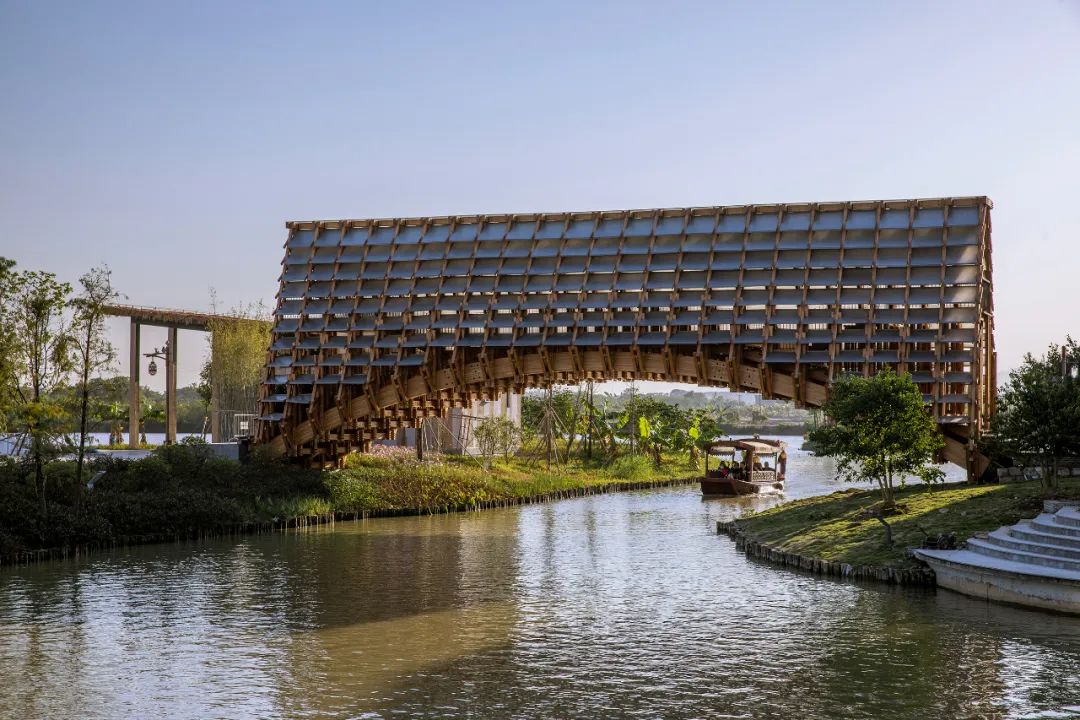

设计单位 罗宇杰工作室LUO studio
项目地址 广东江门
完工时间 2022年1月
桥体尺寸 25.2米×7.3米×8.6米
江门古劳,因为特殊的滩涂地理,素有利用水域进行围墩渔耕的传统,由于水系、鱼塘在村落中占据了极大的场地、分割出很多地块,“桥”作为各区域的连接体,特别常见。随着大湾区城市群快速发展,大量村民放弃传统渔耕生活而选择城市化栖居,以渔为生的水乡村落也在城市发展进程中慢慢消亡。
Due to the unique tidal flat landform, Gulou in Jiangmen City established the tradition of making use of the water system to dig ponds and form mounds for fishing and farming. As the water system and fish ponds occupy a large area and form a fragmented spatial pattern in local villages, many bridges have been built to connect the areas segmented by water. With rapid urbanization in the Guangdong-Hong Kong-Macao Greater Bay Area, many local villagers have abandoned the traditional fishing lifestyle in favor of living a more urban life. For this reason, water villages in which people make a living by fishing have been gradually disappearing.

古劳水乡,是华侨城进行以乡村振兴为大背景的区域开发项目,意在保留围墩空间肌理的前提下,让城乡发展与村落历史文脉有机结合:维持水乡基本河域形态,将自然教育、亲子休闲和渔牧文化进行有机连接。这些业态的营造需要在必要的区域进行桥梁的搭建,方便人群、渔船的顺利通行。
Gulou Waterfront is an eco-cultural tourism resort developed by OCT in the context of rural revitalization, aiming to combine rural development with the cultural background of local villages on the premise of preserving the unique spatial fabrics featuring mounds and ponds. The resort maintains the form of the basic local water system while organically integrating nature education, parent-child recreation, and fishing & husbandry activities. Those operations in the resort require several bridges in certain areas, to facilitate the movement of people and fishing boats.
▲ 视频介绍 制作:金伟琦、肖石明
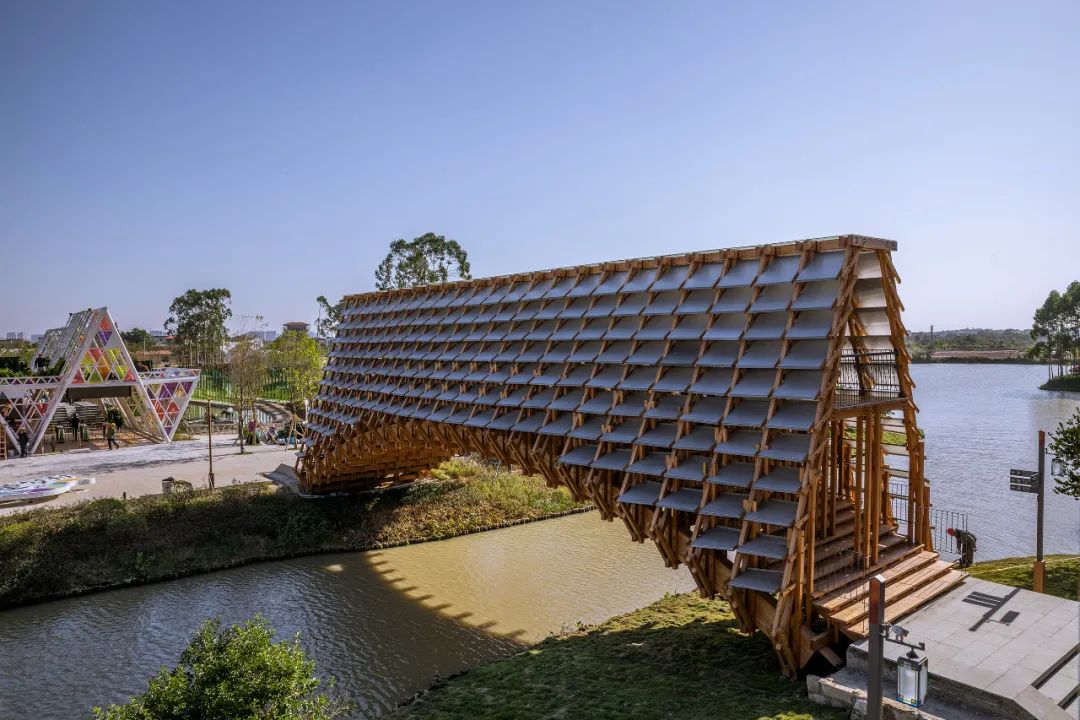
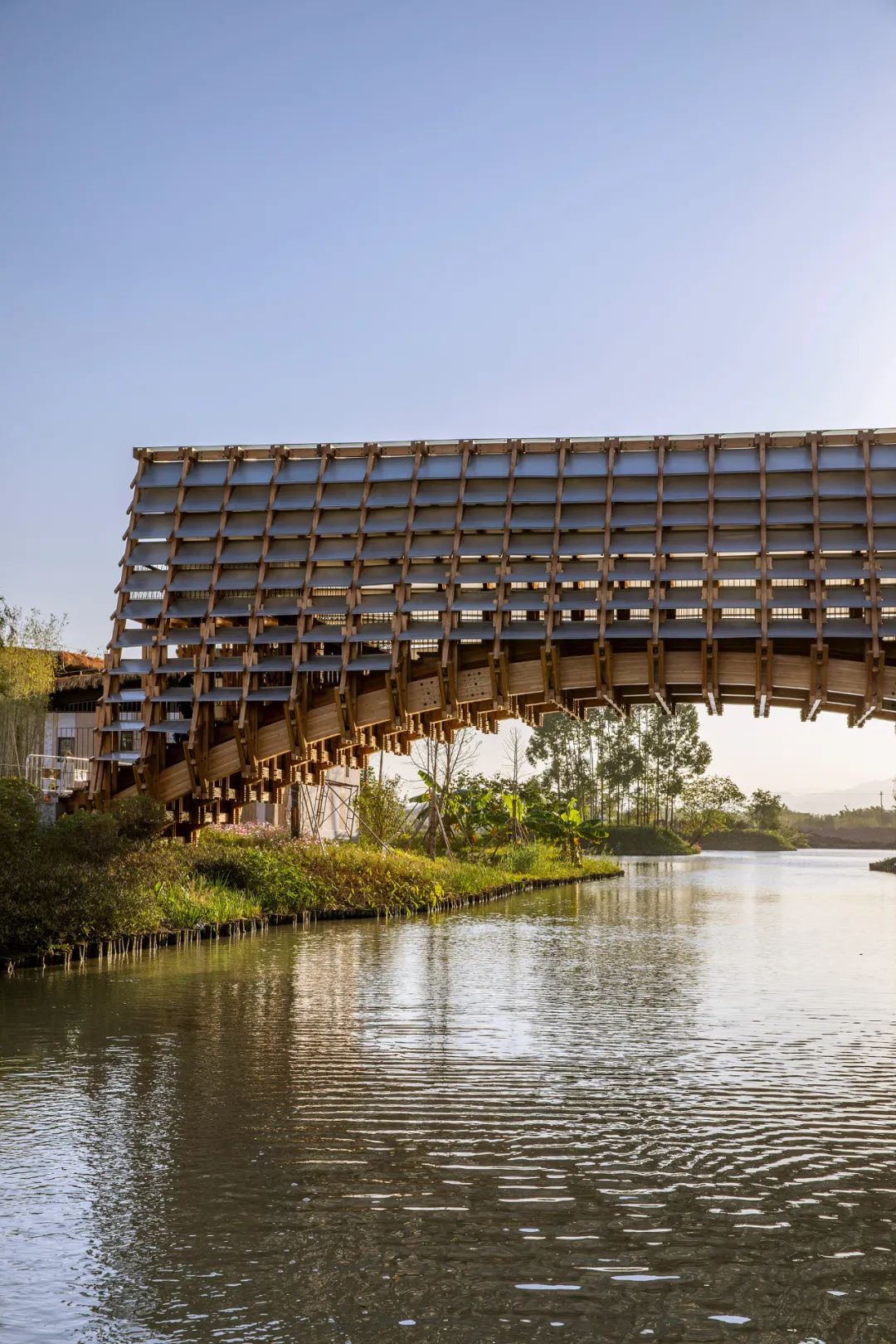
渔耕文明时期陆路不畅,漕运是重要的通航、物流手段,桥上要通行、桥下也需要提供船只通航,“拱”可以获得更大的桥下通行空间,在中国造桥的传统方式中,选择“拱”营造可得结构效能极高;另外南方多河流也多林木,亦有以“木”造桥的传统。
During the fishing civilization period, roads were poorly developed, so water systems became the key route for transportation and logistics. Since bridges need to be walkable while also ensuring more space for boats underneath to pass through, traditional bridge construction techniques in China adopted "arches" to create space for the passage of boats under bridges, and enhance the effectiveness of the structure. Due to the abundance of woods, Southern China has the tradition of applying timber to build bridges.
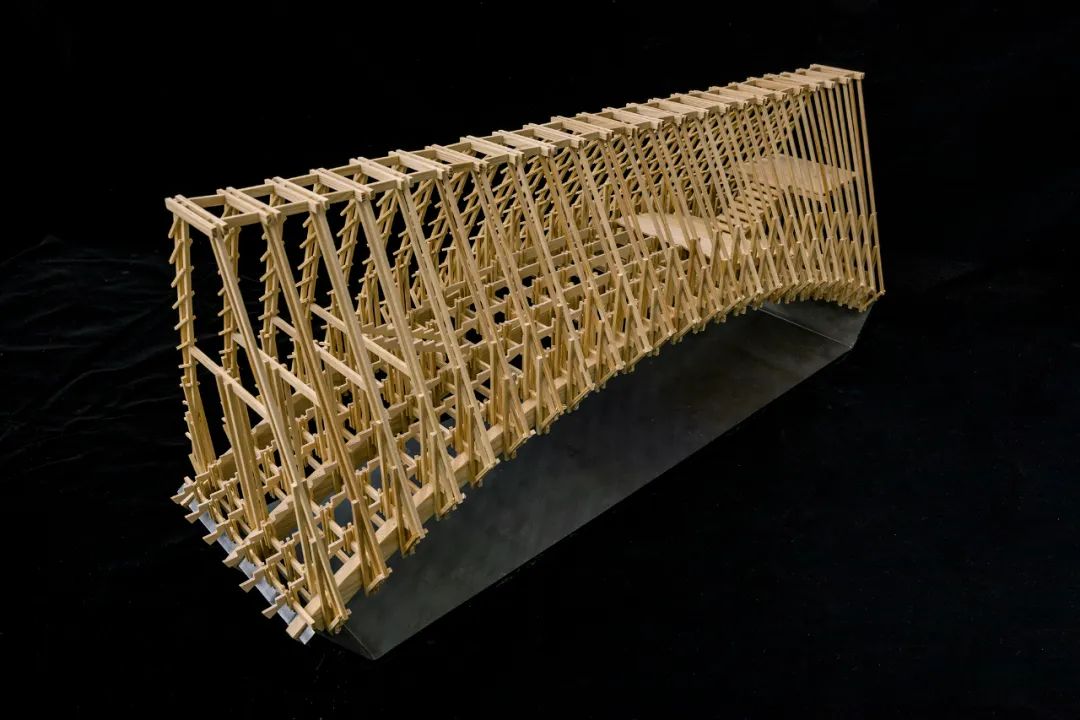
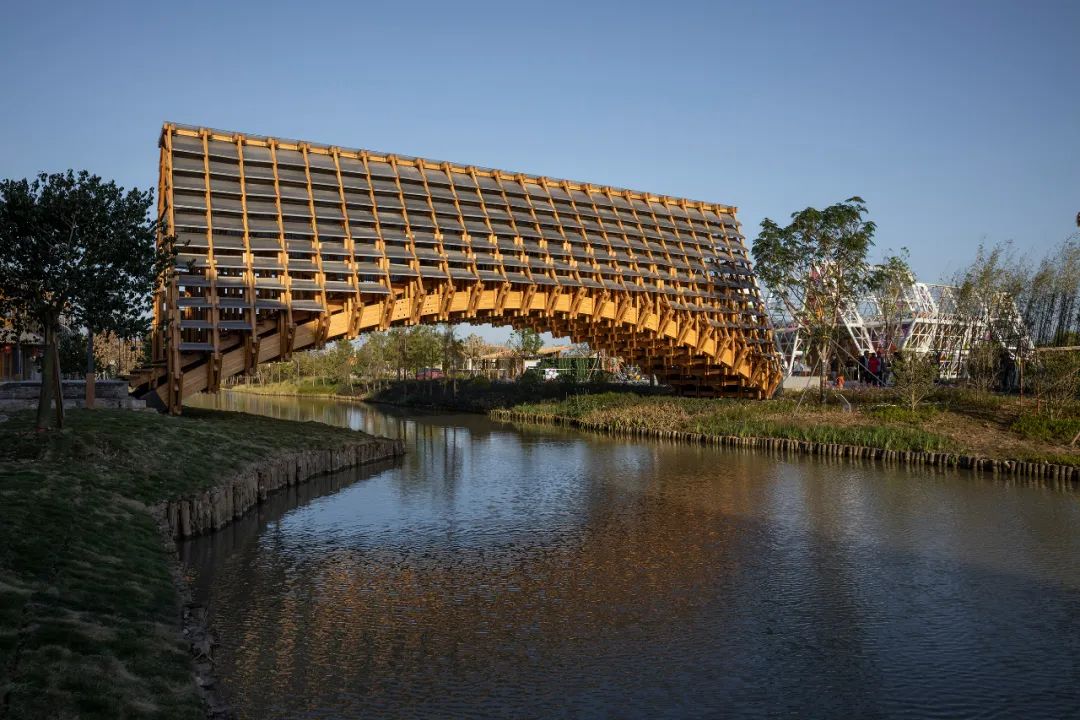
木桥是古劳水乡众多桥梁中的一座,为了区别于城市化建设,重塑传统乡土文化,设计师采取以“自然材-木料”的形式进行拱桥建造。水乡除了渔民的小木船通行外,还提供有游客参访的大船,为了保证桥下各船只的顺利通行,两端承台拱底高于常水位1.35米、拱弦高2.8米,两者相加4米有余,保障了桥体底部与水面的游船通行净高需求。
This project is a timber bridge, which is one of the many in Gulou Waterfront Resort. To differentiate it from urban constructions and revitalize traditional rural culture, LUO studio adopted natural wooden materials to construct an arched bridge. The resort provides access for small fishing vessels, as well as large tour ships. To enable boats of various sizes to pass under the bridge smoothly, the load-bearing platform at the bottom of the arch which is 1.35m higher than the normal water level, combined with the 2.8m arched structure, forms a space more than 4m higher than the normal water level.
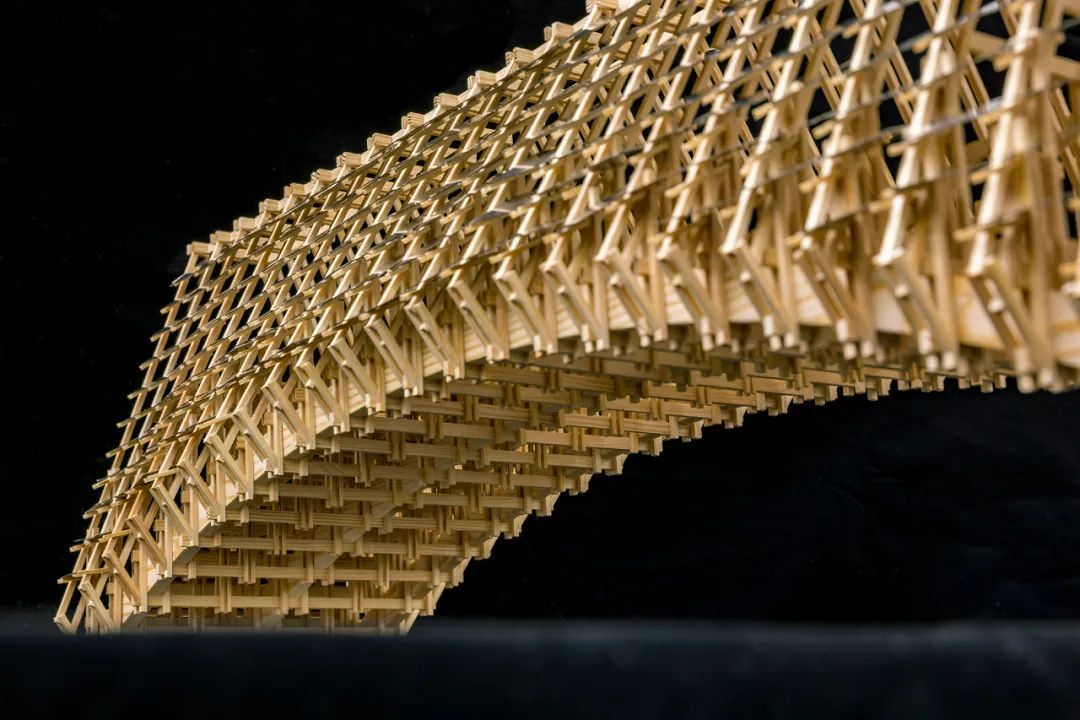
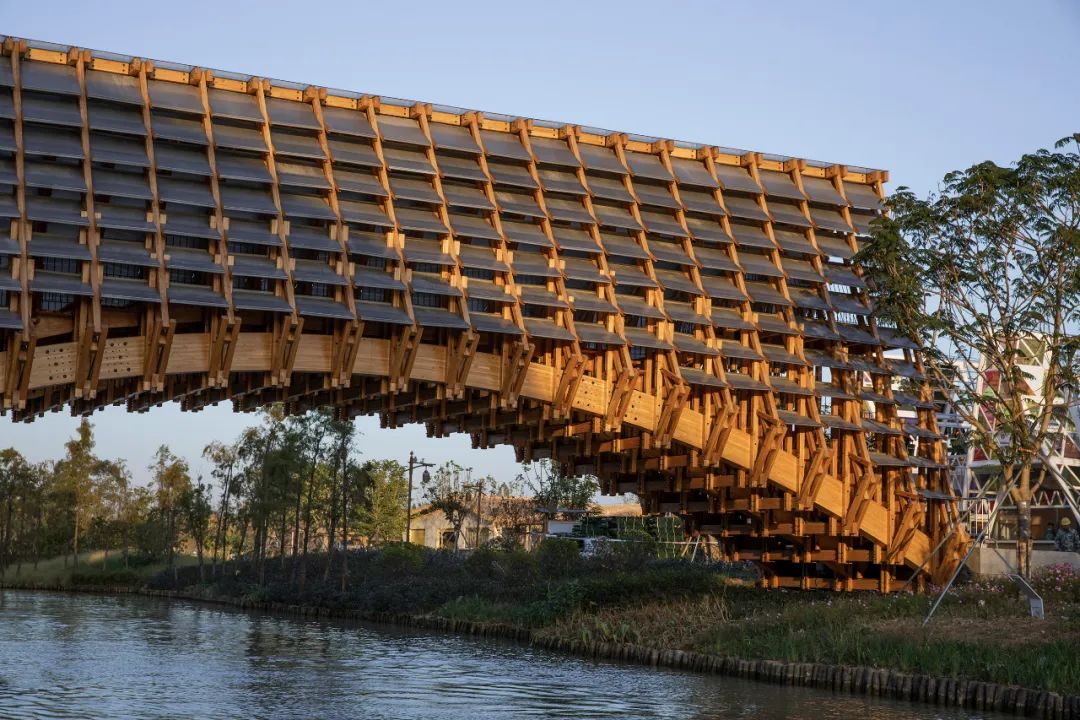
桥拱跨度依地勘、结构合理的两岸间隔,定为25.2米,通过结构计算和建造梳理,设计师采取了三根曲木大梁作为主结构件、以2.7米的轴线间隔进行平行排布。每根大梁考虑到加工和运输的性价比,在合理的位置分隔成三段,开“榫卯”加钢构螺栓连接,通过这三段小曲梁在现场施工拼合,再组成完整的大拱梁。
This meets the clearance requirements for large tour boats to pass through. Based on geological surveys, the span of the bridge is set at 25.2m. Through structural calculation and construction analysis, LUO studio utilized 3 large curved beams as main structural components, which are arranged in a parallel manner with a 2.8 spacing between each other. With full consideration of manufacturing and transportation costs, each main beam was divided into three sections at appropriate positions, connected and assembled by steel-strengthened bolts on the site, to form the complete wooden beam.

该桥位于一个密集的古商街区与儿童游乐园区的衔接处,与其它区位“开放性”景观桥的不一样的处理方式,设计师采取了相对“封闭的廊空间”作为桥体的营造,强化和区别出两个完全不同的空间场域,让游览者在经过两个截然不一样的功能区时有空间过渡的仪式感:从偏“实”的商业性街道——到偏“虚”的梦幻水乡儿童游乐区。
The ridge is located in the joint area between a dense traditional commercial street area and a children's recreation area. LUO studio created a relatively "closed" corridor space on the timber bridge, which is different from other open landscape bridges in the resort. The aims were to accentuate the transition from the "practical" commercial street area to the relatively "dreamy" children's recreation area, allowing visitors to feel a sense of ceremony in the moving process.

桥上架廊的起源很早,古人有记:“桥上架梁,梁上竖屋,结构才完;雨晒阳曝,桥梁几蠹,植易陶瓦,命工覆盖。”最初桥上廊屋是为了强化结构、防雨止潮,使木材保持干燥,可经久不腐,这一传统可追溯到春秋战国时期。
Constructing a covered corridor on bridges has been an old tradition that dates back to the Spring and Autumn Period and the Warring States Period. The initial intention was to strengthen the bridge structure, resist rain and moisture, keep the wood dry and prevent it from corrosion.
古劳水乡木桥也遵循了传统木桥架设廊屋的建造智慧,通过廊的建造在结构上达到整体稳定性,同时也保护下面的拱木结构,避免日晒雨淋。
This project also inherits the construction wisdom of ancient covered bridges. The covered corridor enhances the overall structural stability and protects the arched wooden structure beneath from exposure to sun and rain.

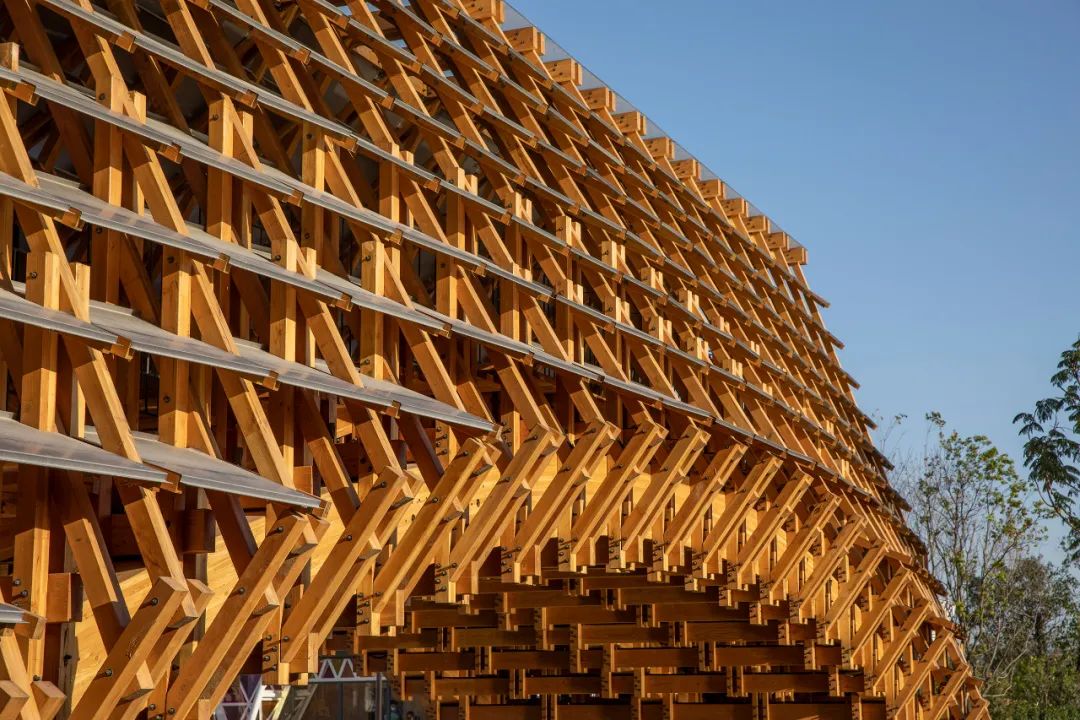
所处珠江三角洲西部地区雨水丰沛,设计师在廊桥的外部采取了相对封闭的建造方式,廊空间外表皮选择金属板材进行层层叠覆,获得有效的雨水遮蔽,也相应形成了一种更内聚感的廊空间。
The west area of the Pearl River Delta where the timer bridge is located has abundant rainfall, so the corridor was constructed in a relatively closed form. The exterior of the corridor space is covered by layers of metal plates, which effectively protect it from rain and also create a sense of cohesion for the space.
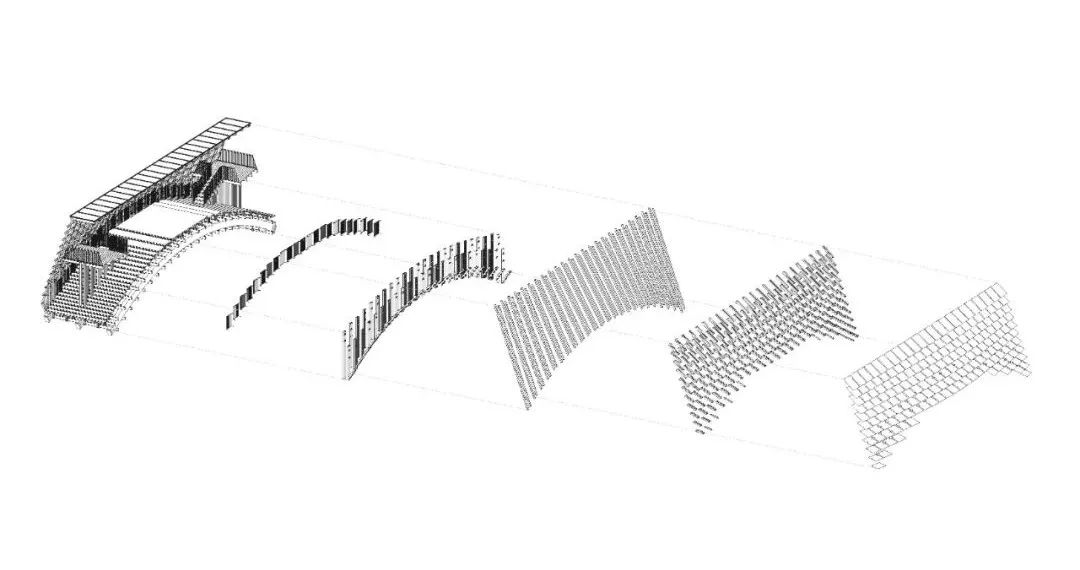
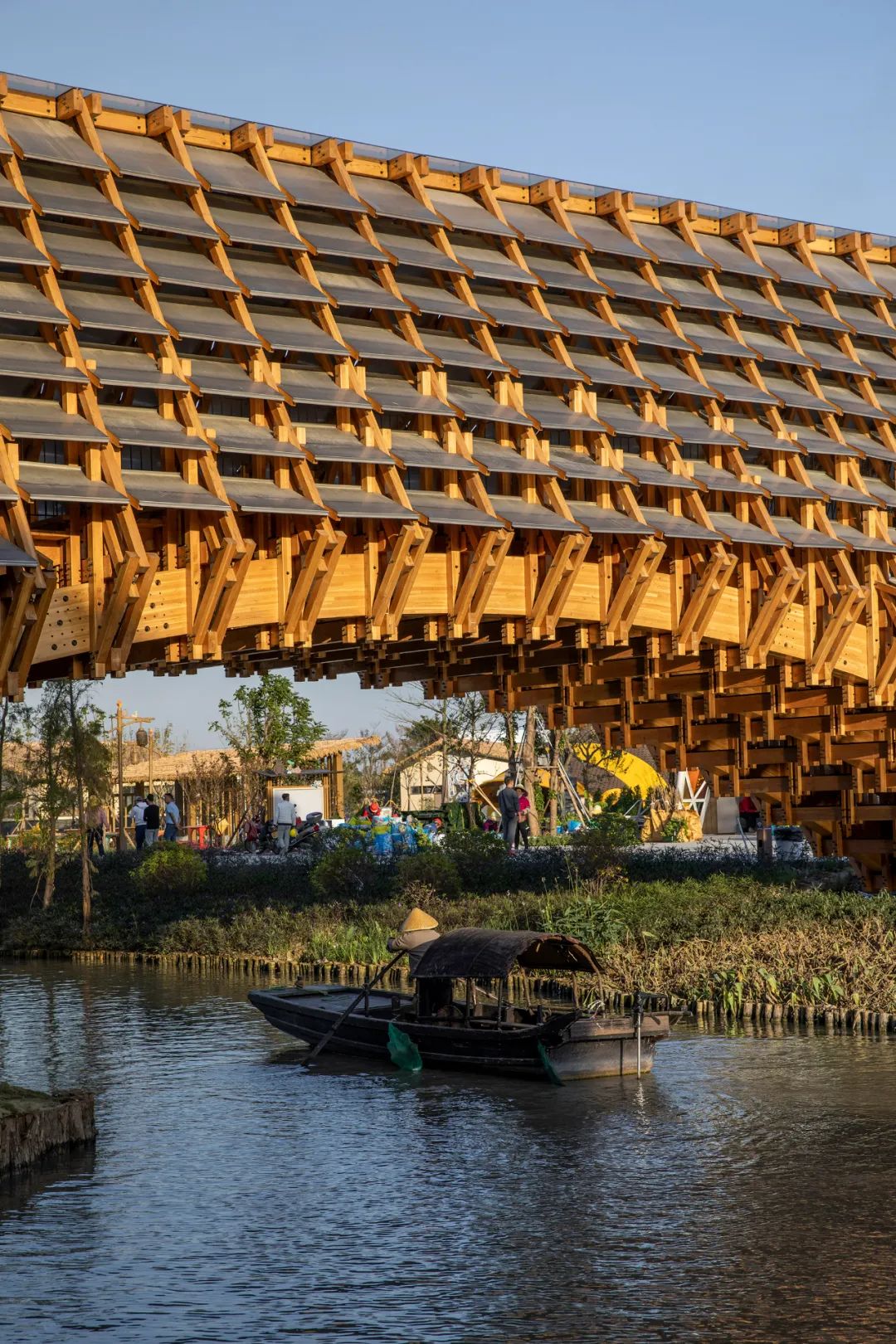
小截面木料的次结构体系
除了承担桥体主荷载的三根大木拱梁截面为600毫米×300毫米外,其他的木料采取了小截面木料(100毫米×100毫米、100毫米×50毫米规格)的建造方式,施工时将小木料于三根大主梁进行上下次梁咬接固定,再从这些小次梁的两端向上收合形成三角受力形态。
Apart from the three large wooden arched beams that bear the main load of the bridge body having a section size of 600mm*300mm, other wooden components adopt small sections. They are either 100mm*100mm or 100mm*50mm. Small wooden components are interlocked and anchored to the three main arched beams, functioning as sub-beams on upper and lower levels. In addition, the two ends of these sub-beams are combined with upward components to form a stable triangle of forces.


从桥顶俯瞰的平面图是完整方形,桥的侧立面“上-左-右”外轮廓也呈方形、只有“下”部顺应“拱”的形态自然取弧,这使得桥廊内部生成“高-低-高”空间渐变。在桥廊的两端由于空间较高,为了结构稳定,设计师在中段设置了横向连接杆件,基于这个结构必要措施搭放了两个观景平台,该平台也避免了从出口处就对廊桥内部一览无余的空间单调感。
The plane of the bridge's roof is a complete rectangle. The top, left, right edges of the bridge's side facades also consist of rectangular silhouettes, while only the lower edge is a natural curve. This generates height variations of the corridor space that is higher on the two sides and lower in the middle. To ensure the structural stability of the covered corridor space, the design team set horizontal connecting rods in the middle section and added two viewing platforms on either side, which also avoid the monotonous feeling when viewing the corridor space from the entrance and exit.
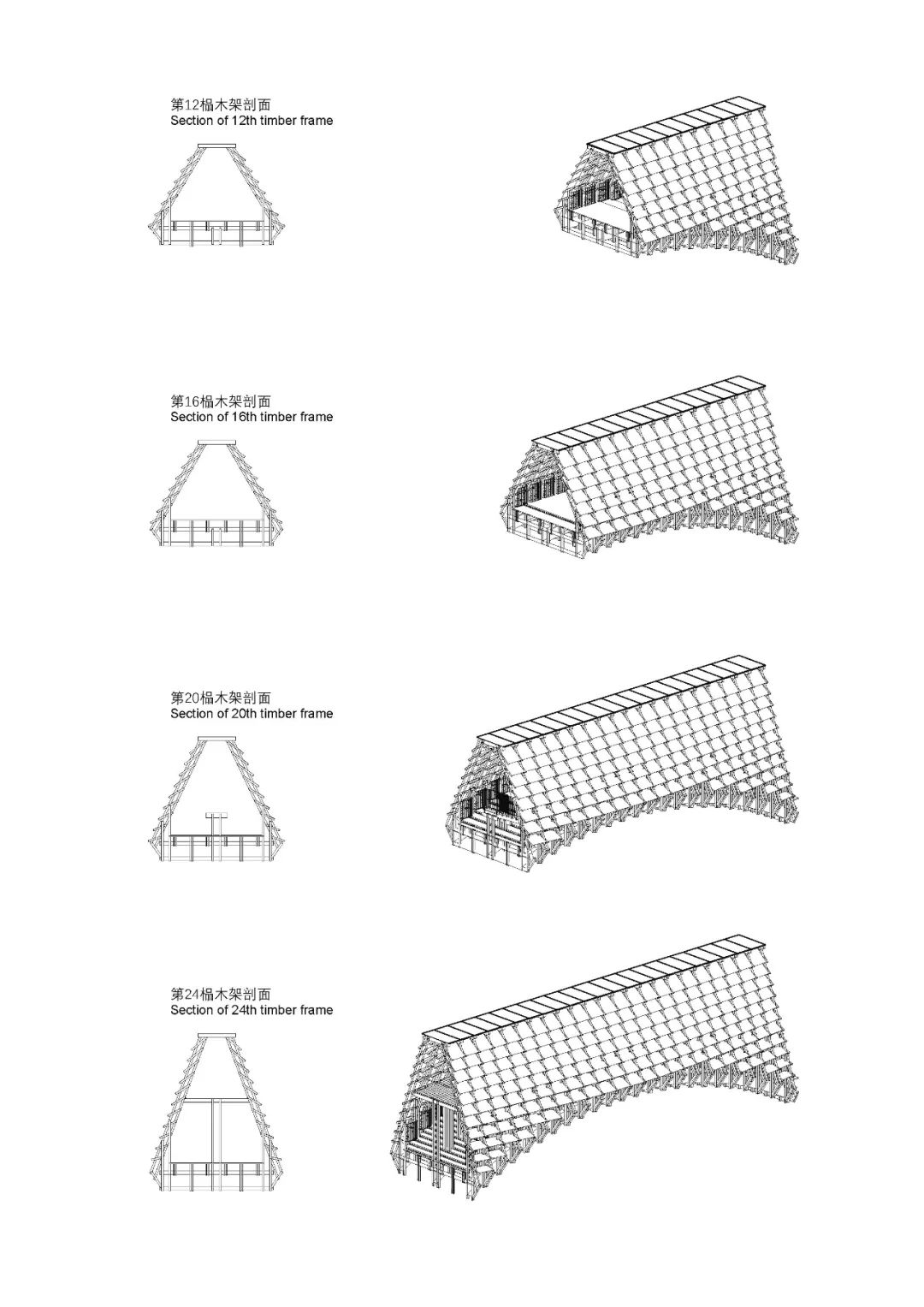
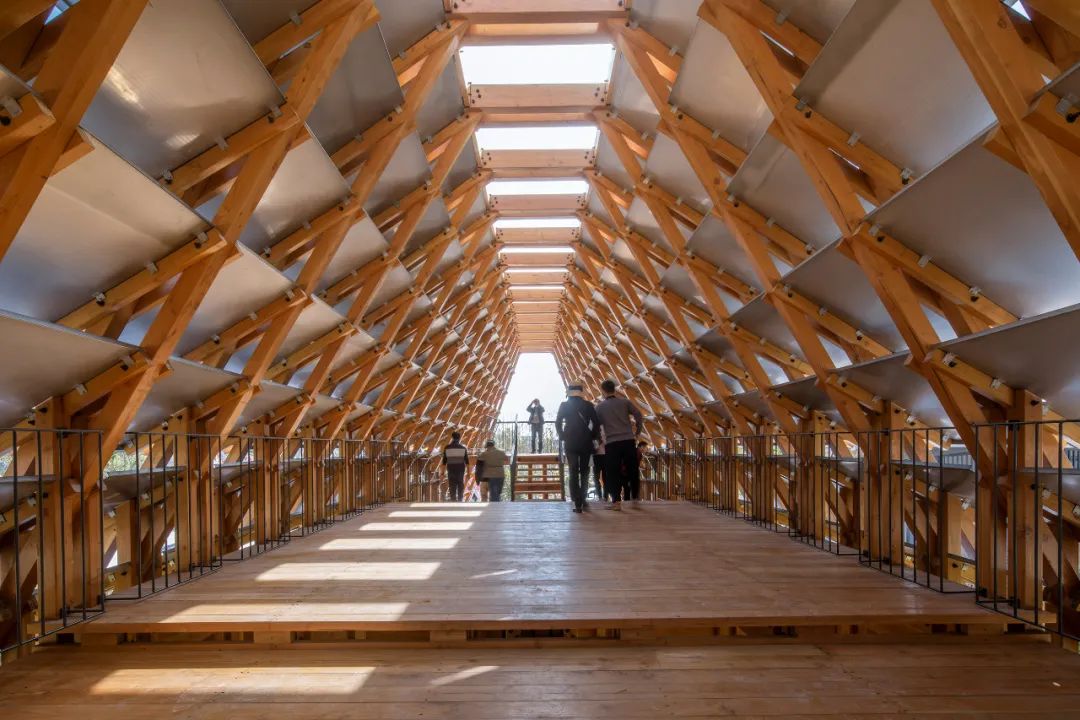
小截面的次结构体系,不仅使得廊空间内部有很好的结构构造感,也让穿行在桥底的游船乘客于桥下观看桥底时,也颇有建造匠艺细节的视觉体验。
The small-section sub-structural system not only enhances the sense of structure in the corridor space but also reveals the elaborate craftsmanship and details to visitors on tour boats and offers them a unique visual experience.
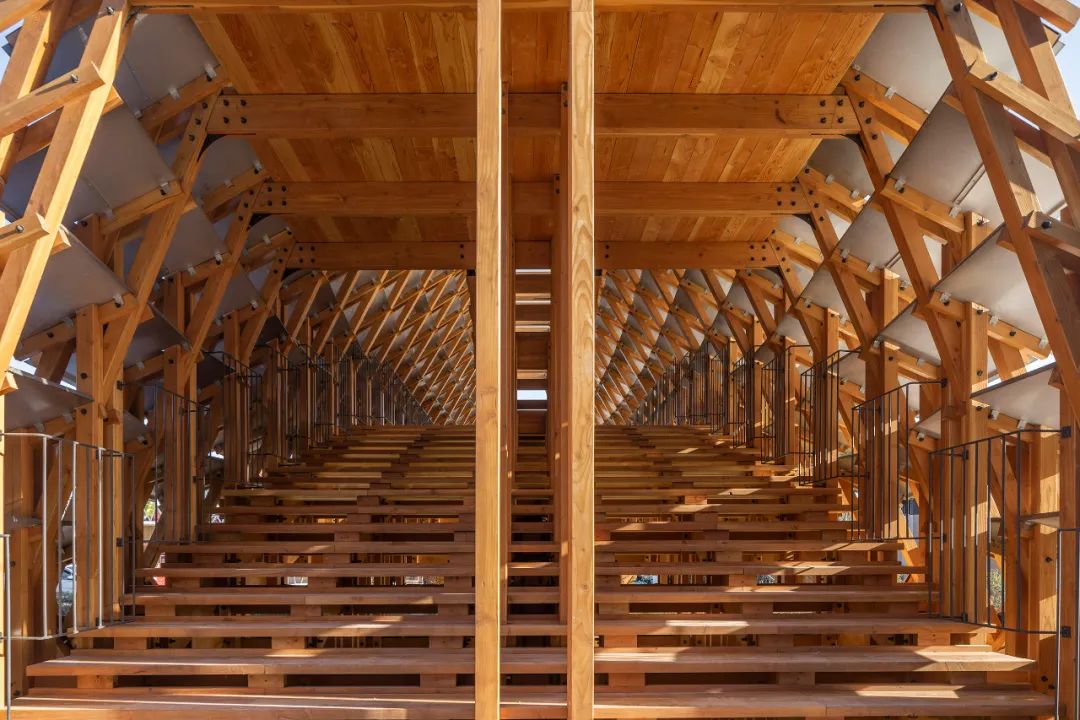
构造模数与材料规格
小截面木料对应小间距排布,按照次结构梁每榀1000毫米等分的轴线间隔,这个尺度可以很好地与台阶、外金属表皮的建造尺度相匹配。
The small-scale wooden components are arranged with small spacing in between. The spacing between neighboring substructures is set at 1,000mm equally. This perfectly matches the scales of the steps and metal exteriors.
拱曲陡的地方形成三步台阶高度、拱曲缓的地方设两步台阶高度;外表皮金属板材在1000毫米轴线尺寸内控制于900毫米左右的边长尺寸,从加工、运输、人工安装等各工艺流程来说,都是非常适宜的大小;900毫米的间隔也是单人于两框之间站立、倚靠、停歇等比较适宜的尺度。
Between neighboring sub-beams, three steps are set at the steep sections of the arch, while two steps are set at the gentle sections. The length of each external metal plate is controlled at about 900mm, which is appropriate for manufacturing, transporting, and installation. The 900mm length of timber frames also provides a suitable space for a single person to stand, lean, and rest.
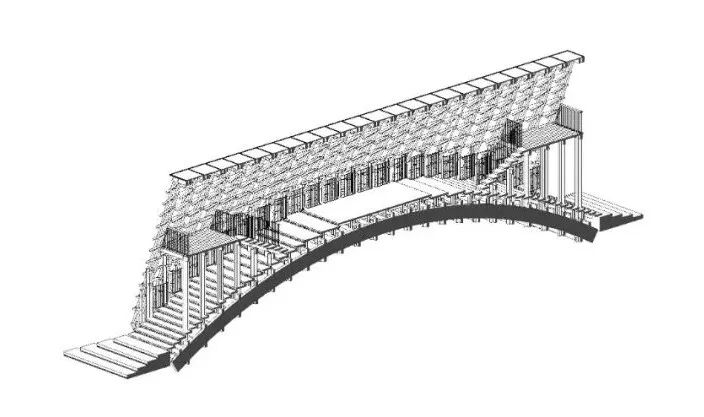
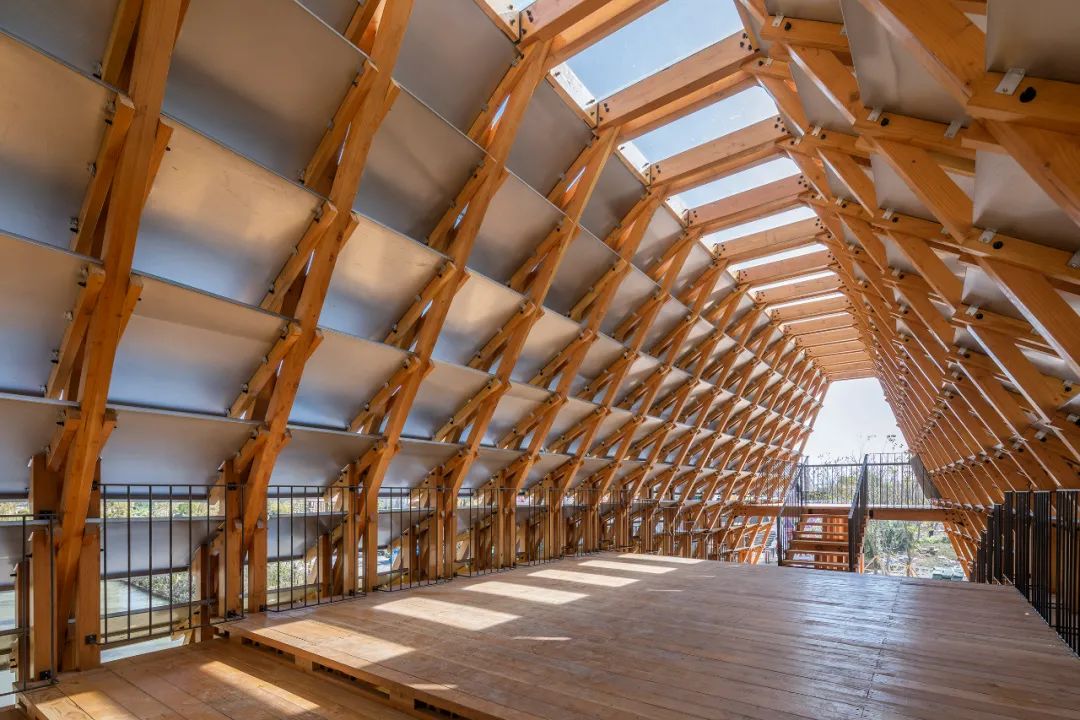
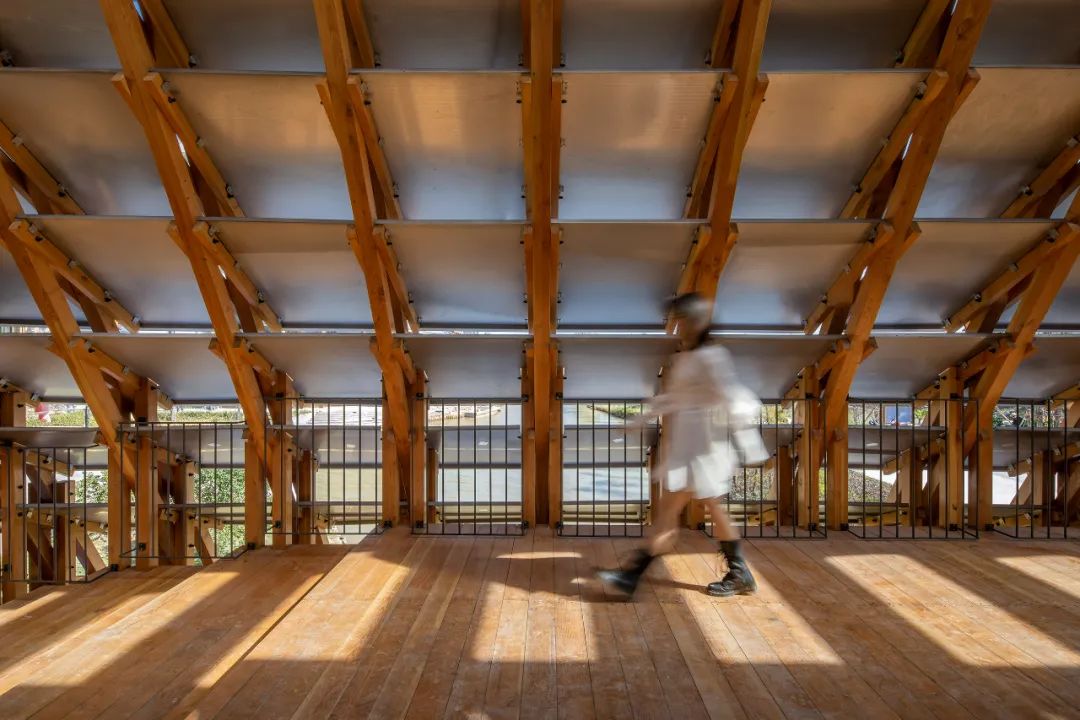
顶光、侧缝、底隙
廊地面台阶上下层控制在70毫米间隙,廊侧面的金属表皮上下叠压控制于200毫米左右的透缝,廊顶部中央设置了一道1500毫米宽窄的采光带,使人从桥两端入口缓步进入桥廊时,目光可以透过台阶上下踏步间的狭小缝隙,隐约感觉到廊桥之下的波光粼粼。
The neighboring upper and lower steps of the corridor have a clearance of 70mm. A gap of about 200mm is set in between layered metal plates on the exteriors of the corridor space. A 1,500mm-wide daylighting belt is set at the middle of the corridor roof. When walking slowly into the corridor space from the entrances at both ends, visitors can catch the sparkling water under the bridge through the narrow gaps between steps.
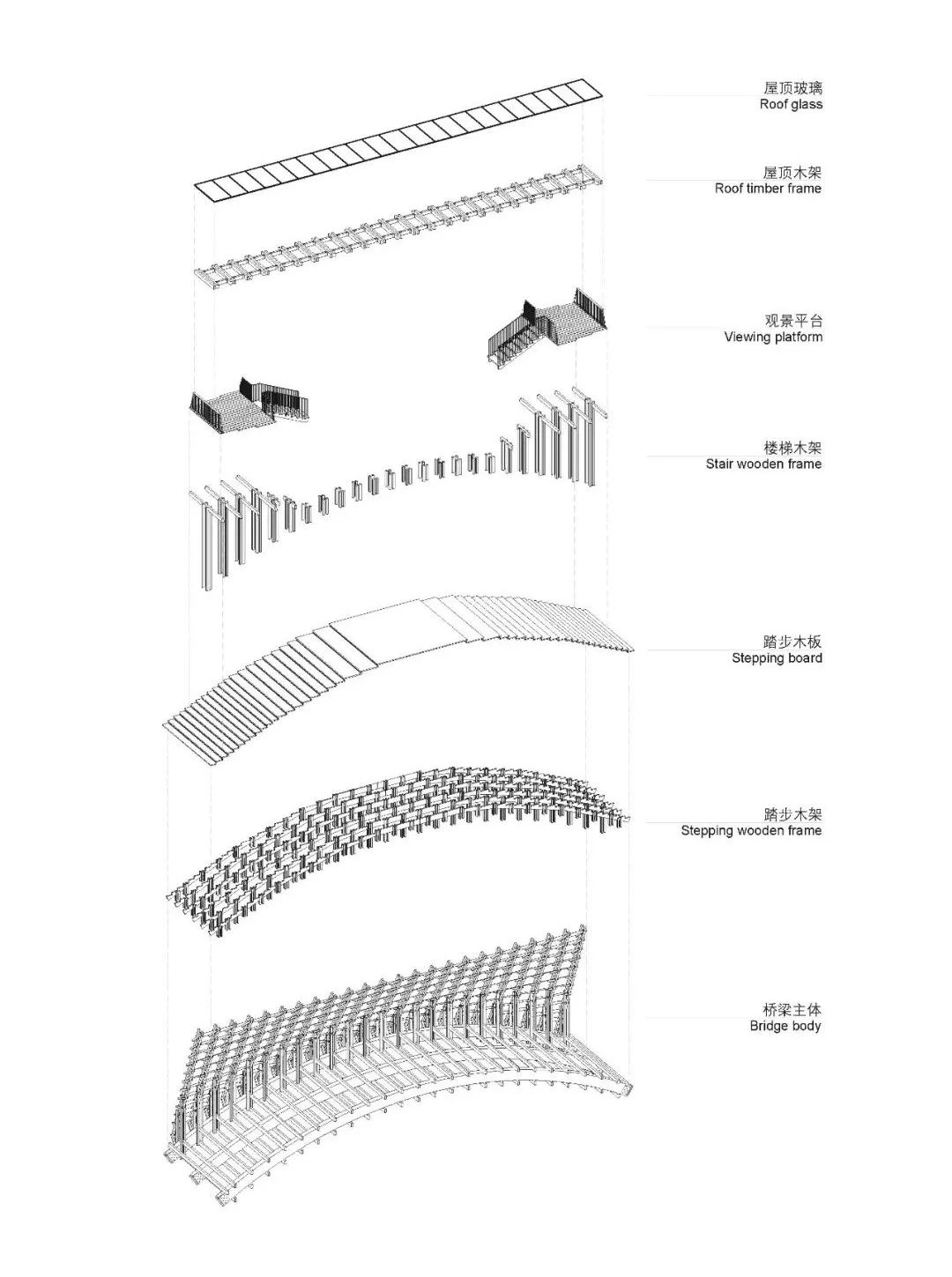
在爬升桥体的过程中,上下金属板缝之间的折射亮光会吸引人透过侧缝向往观望,这种被“收藏”的观感,区别于其他的桥体,成为一种特别体验;当穿过两端的平台而达到廊的中央,顶部的光影被充分而全然获知,带给观者一种静谧、阔朗感觉,形成一个连续的“先抑后扬”空间秩序。
As they continue to climb the bridge, the bright light refracted by the upper and lower metal plates attract them to look out through the side gaps. Such a special “collected” viewing experience distinguishes this timber bridge from other open bridges. While passing through the platforms from two ends to reach the center of the bridge corridor, visitors can fully experience the light and shadows from the top, feeling calmness and openness in the mind. Such design forms a continuous spatial rhythm that gradually reaches the climax.
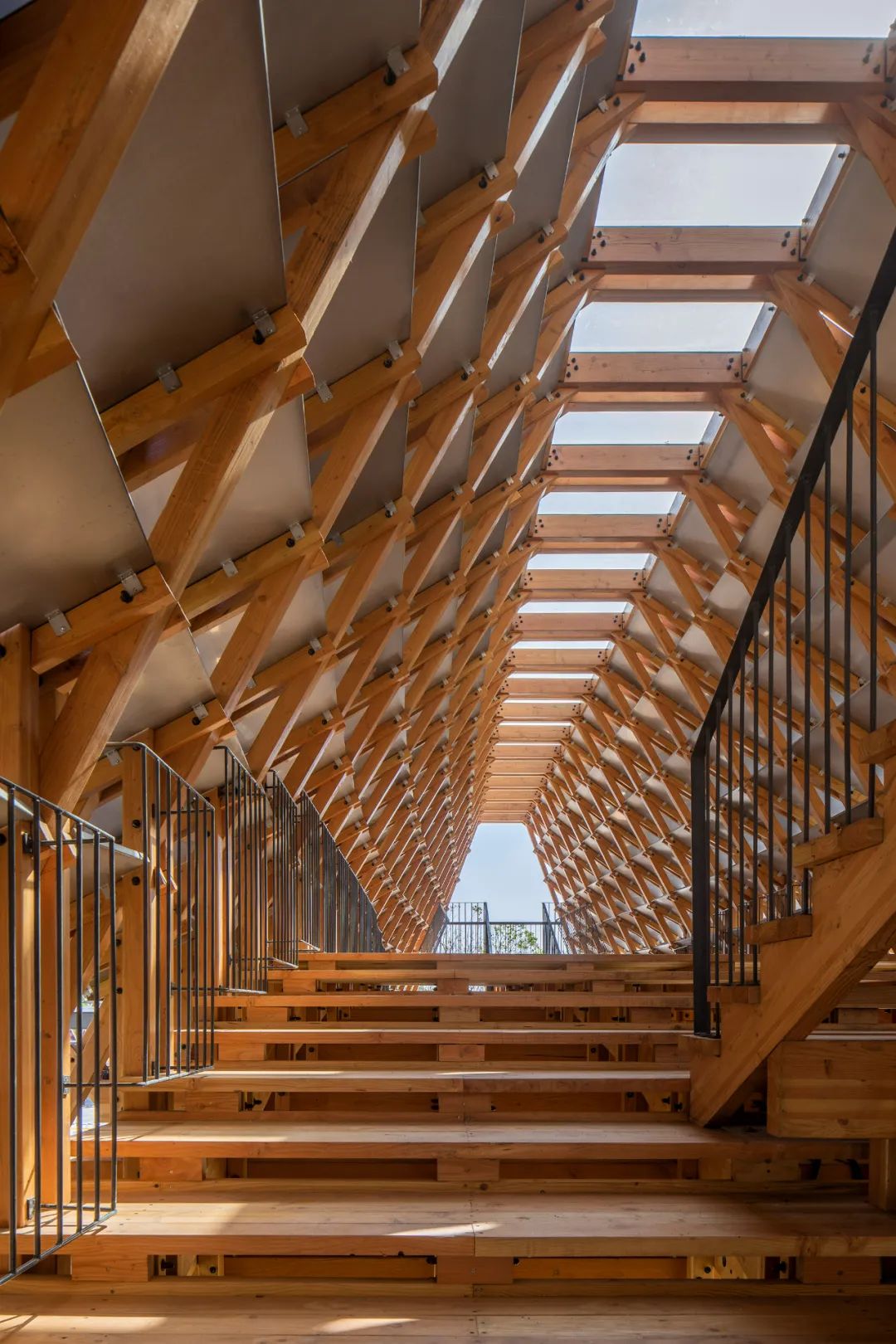

基于工厂产业化标准生产加工的材料,所需木料、金属都是现行工业技术手段,安装和施工过程除了大梁借助大型机械进行吊装,其他的后续施工环节兼顾“乡土”这个大的区域语境,凭借工人的双手即可搬运、安装,既有效照顾了周围的交叉施工区域、也借助工业化的高效,同时传达出了乡土温度和建造的在地性。
The materials utilized were manufactured and processed by factories based on industrialization standards, and all the necessary timber and metal components were treated by modern industrial technology and methods. During the installation and construction, only the three main beams were hoisted by large machinery. All other follow-up construction steps were fully adaptable and transportable through the hands of the workers in response to the local context. The whole construction process not only effectively harmonized with the surrounding construction sites and took advantage of efficient industrialized methods, but also conveyed rural warmth as well as the “localization” of construction.
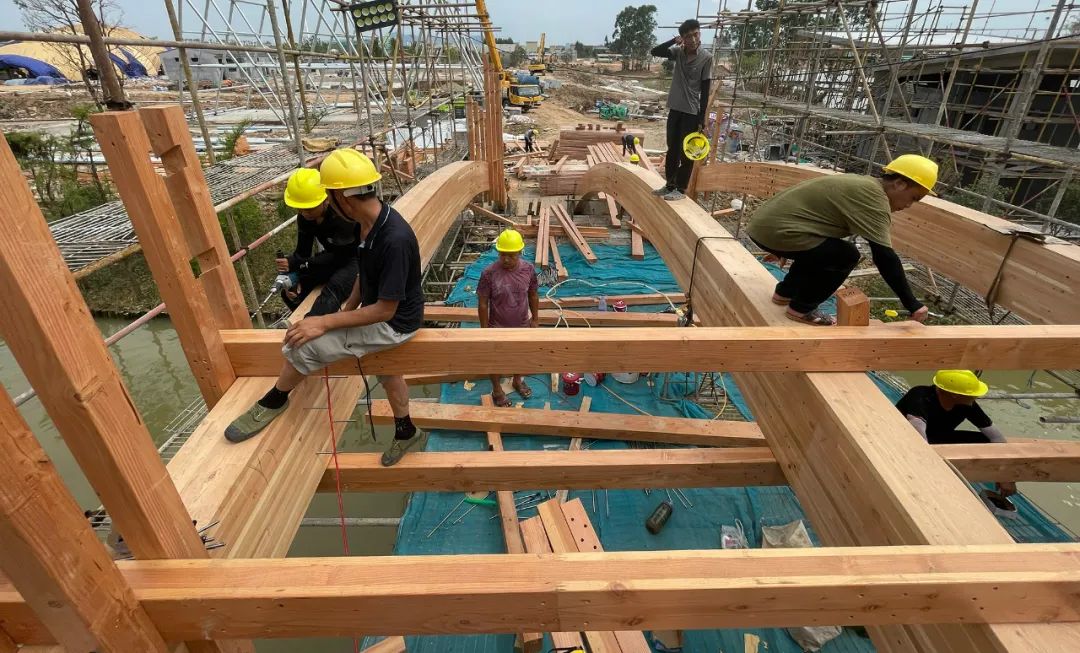
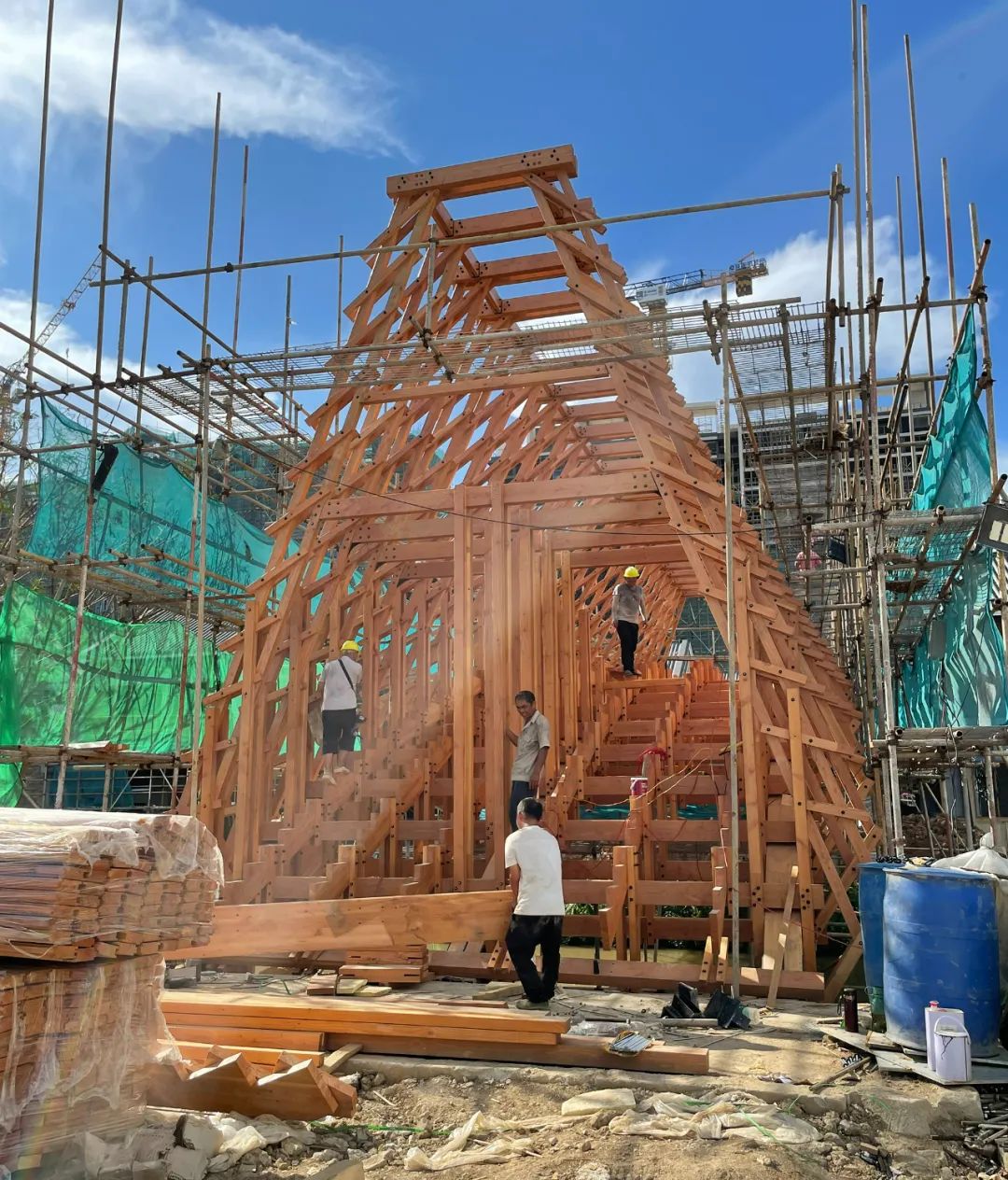
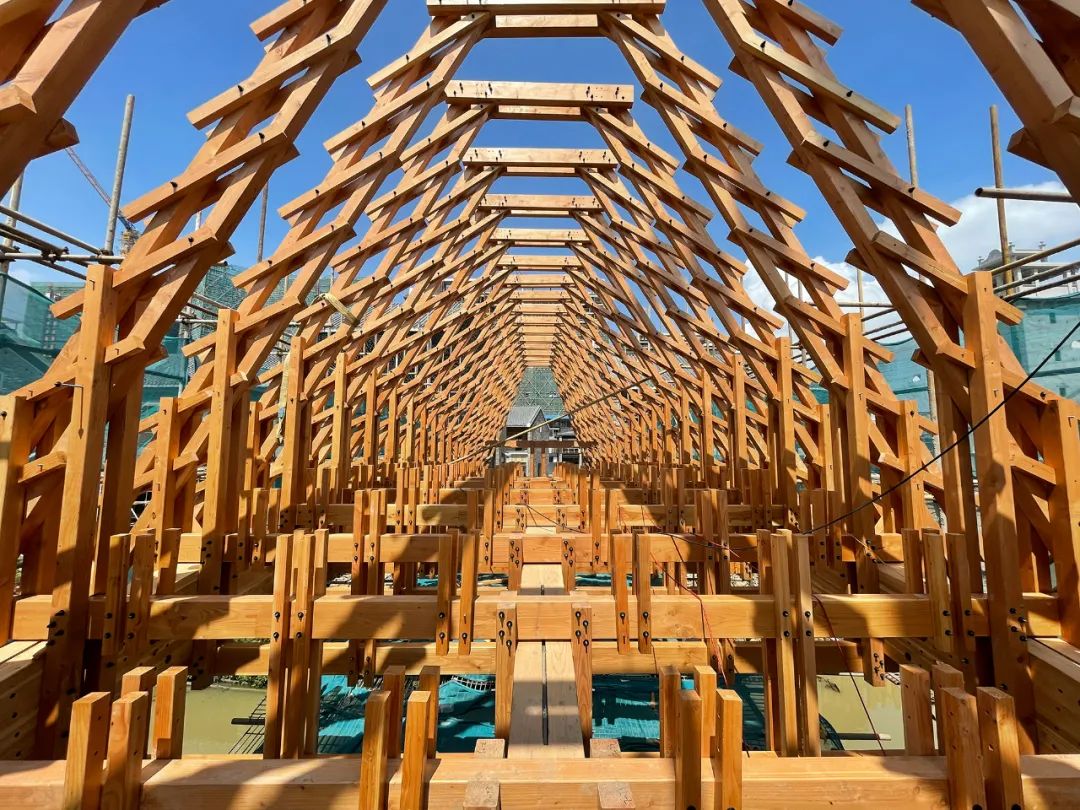

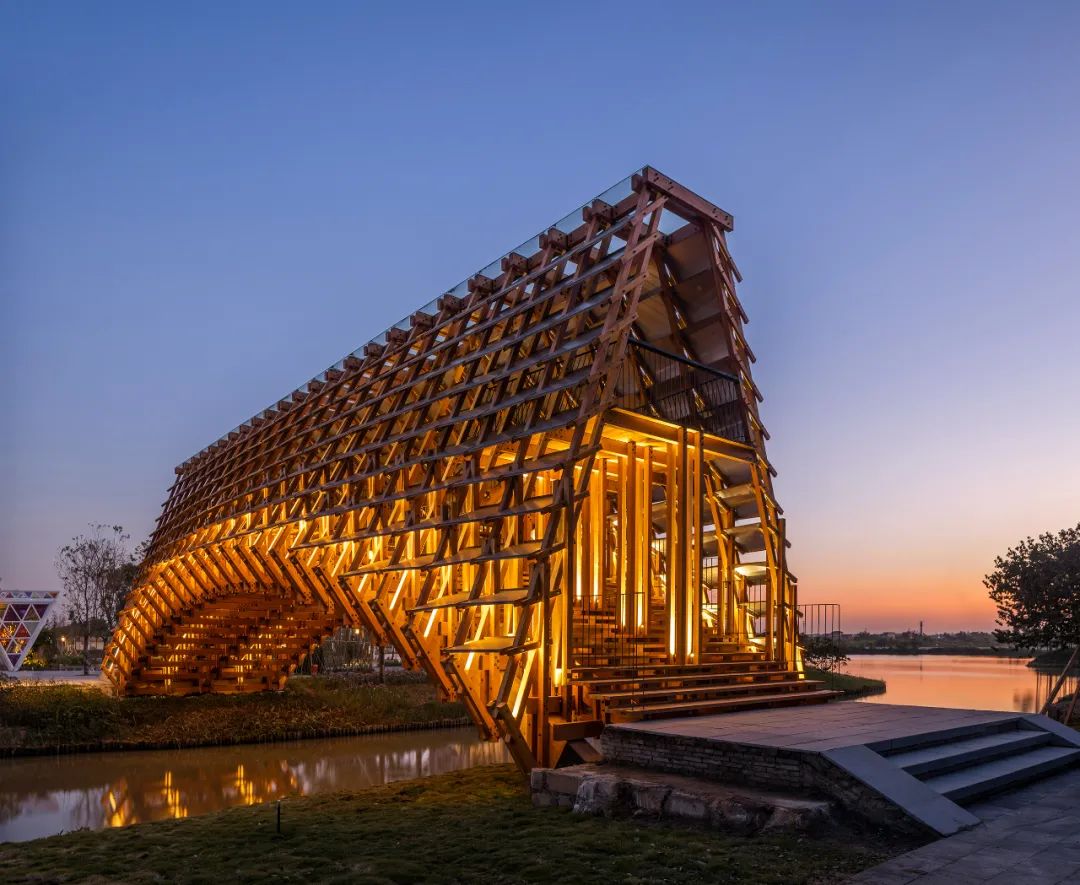

设计图纸 ▽

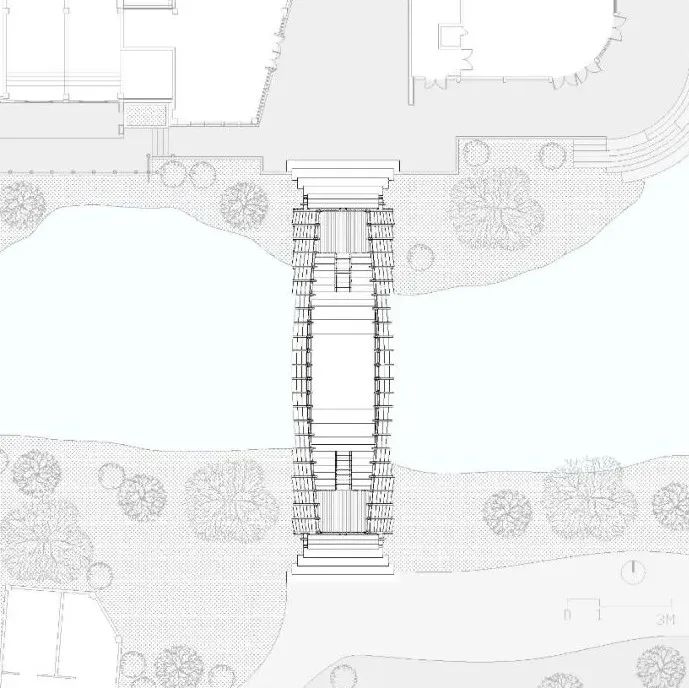

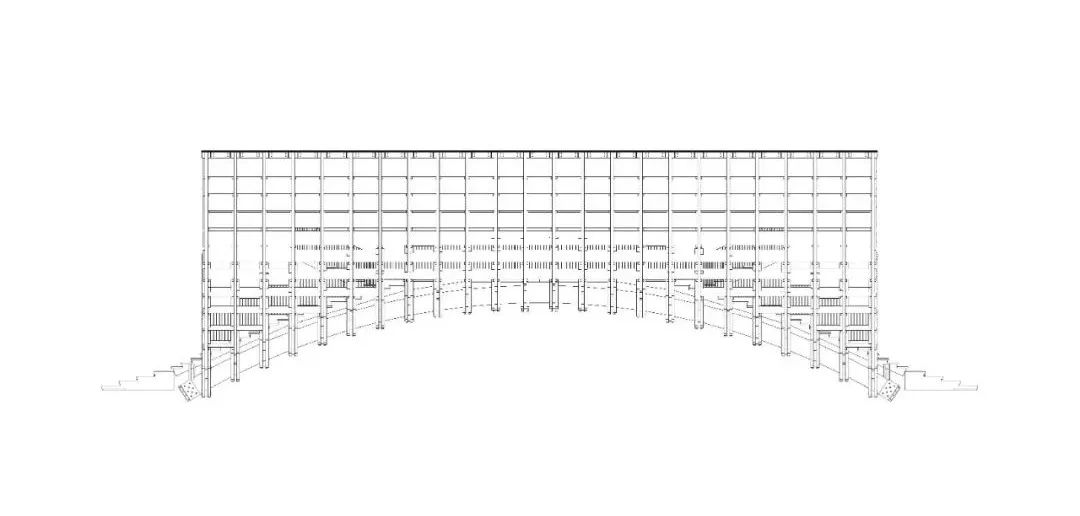
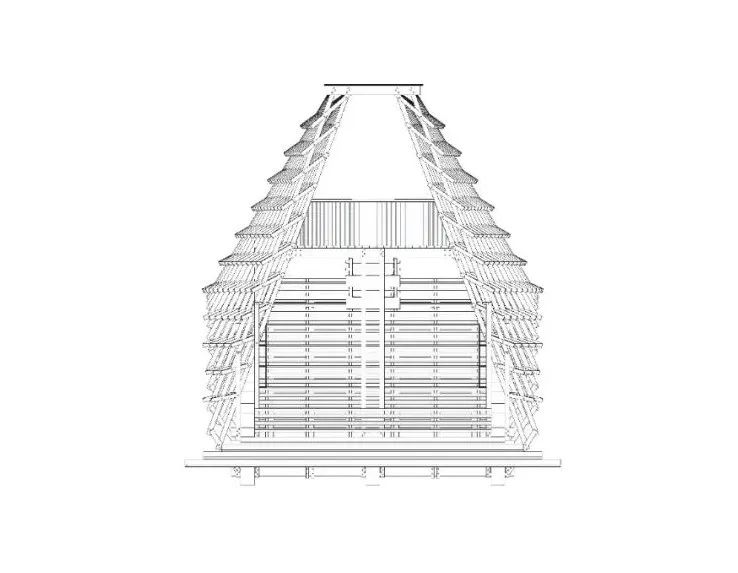
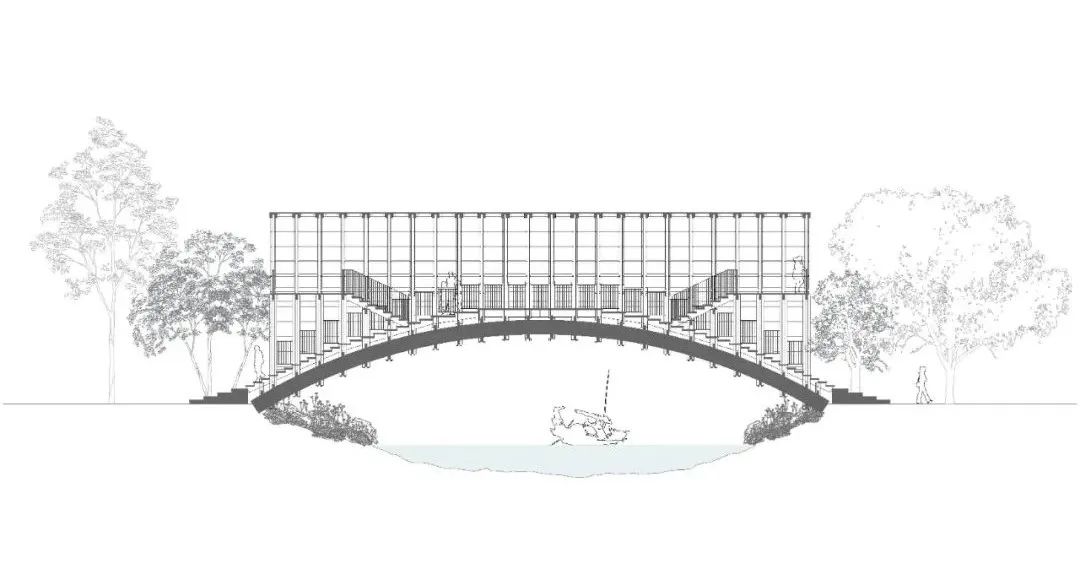
完整项目信息
项目名称:古劳水乡木桥
业主:江门华侨城投资发展有限公司
设计团队:罗宇杰工作室LUO studio
设计人(兼施工指导):罗宇杰、卢焯健、王蓓蕾
结构顾问:栾栌构造设计事务所
施工组织:深圳市振辉建筑工程有限公司
木材供应方:上海圣特豪森木结构有限公司、辽宁金柏胜木结构科技有限公司
灯具供应厂家:广东流星宇数码照明有限公司
项目地址:中国广东省江门市古劳水乡
摄影:金伟琦
视频制作:金伟琦、肖石明
总面积:166平方米
桥体尺寸(木结构部分长、宽、高):25.2米×7.3米×8.6米
材料:松木、混凝土、铝板、玻璃
设计时间:2021年3月
完工时间:2022年1月
本文由罗宇杰工作室授权有方发布。欢迎转发,禁止以有方编辑版本转载。
上一篇:有方视频 | 西部(重庆)科学城未来校园设计国际竞赛·第一季 – 4号场地视频
下一篇:MPavilion2021正在展出,由MAP工作室打造的城市“万花筒”